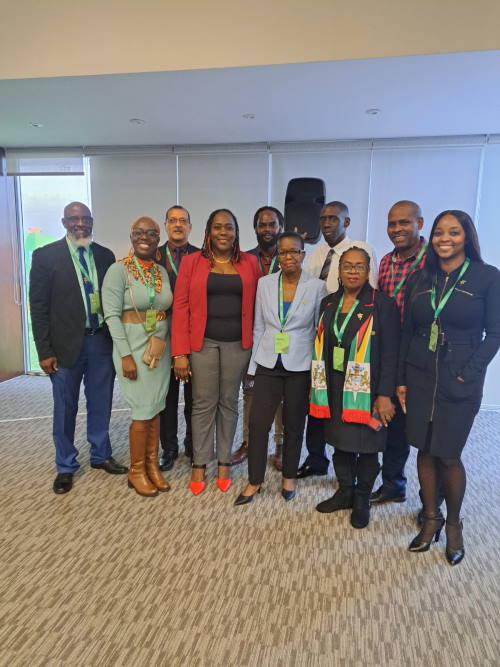~The 9th Annual Meeting of the Regional Initiative for Latin America and the Caribbean Free of Child Labour has begun.~
 Lima, Peru:--- The Regional Initiative for Latin America and the Caribbean Free of Child Labour, an intergovernmental and tripartite action platform that promotes the eradication of child labour in the region, began its 9th Annual Meeting in Lima, Peru yesterday with the participation of representatives from 31 countries of the region, as well as regional representatives from the International Organization of Employers (IOE) and the Trade Union Confederation of the Americas (TUCA-CSA).
Lima, Peru:--- The Regional Initiative for Latin America and the Caribbean Free of Child Labour, an intergovernmental and tripartite action platform that promotes the eradication of child labour in the region, began its 9th Annual Meeting in Lima, Peru yesterday with the participation of representatives from 31 countries of the region, as well as regional representatives from the International Organization of Employers (IOE) and the Trade Union Confederation of the Americas (TUCA-CSA).
The main goal of this meeting is to analyze and propose actions that will accelerate the region's progress towards the elimination of child labour, as established in Goal 8.7 of the Sustainable Development Goals. This meeting is of vital importance as Claudia Coenjaerts, Acting Regional Director of the ILO for Latin America and the Caribbean, stated, "We have clear indications that point to the combination of the multiple crises affecting us and the increase in inequalities in the region, which may have significantly increased the number of girls, boys, and adolescents in situations of child labour."
A robust agenda will guide the participants in discussing the regional tripartite vision, national commitment, and local impact, with the aim of making Latin America and the Caribbean the first region free of child labour. To this end, national action plans will be presented to accelerate the elimination of child labour, and best practices, opportunities, and alliances will be identified.
In this regard, the Director of the Andalusian Agency for International Cooperation, Celia Rosell, highlighted the region's progress and the impetus of the Regional Initiative, focusing on accelerating the eradication and prevention of child labour and addressing the factors that drive girls, boys, and adolescents into situations of child labour.
During this event, the almost ten years of intense work carried out by the Regional Initiative will be highlighted, as pointed out by José Piqueras, Coordinator of the Spanish Agency for International Cooperation and Development (AECID) in Peru, who stated, "Next year we will celebrate the 10th Anniversary of this Initiative, and AECID aims to support a significant celebration of these years of work, in coordination with the ILO, because we seek that no child or adolescent has to leave school or have their education affected in the classroom due to the need to work to contribute to their own and their family's support."
On her part, the representative of the Brazilian Cooperation Agency (ABC), Mónica Salmito, mentioned the possibility of holding the next annual meeting of the Regional Initiative in Brazil.
It is worth mentioning that this will be the first meeting in which Belize is participating as a member of the Regional Initiative. Additionally, it will be the first time since the beginning of the pandemic that the meeting is beeing held in person.
"We invite you to join and collaborate in this regional space, with national impact, which makes up the Regional Initiative," said Pilar Rodríguez, Coordinator of the Technical Secretariat of the Regional Initiative.
The Regional Initiative for Latin America and the Caribbean Free of Child Labour is a space where 31 countries have been working in an articulated and tripartite manner to achieve the first generation of people free from child labour in the region.
Currently, the Regional Initiative is composed of: Antigua and Barbuda, Argentina, Bahamas, Barbados, Belize, Bolivia, Brazil, Chile, Colombia, Costa Rica, Cuba, Ecuador, El Salvador, Grenada, Guatemala, Guyana, Haiti, Honduras, Jamaica, Mexico, Nicaragua, Panama, Paraguay, Peru, Dominican Republic, Saint Kitts and Nevis, Saint Lucia, Suriname, Trinidad and Tobago, Uruguay, and Venezuela; together with the International Employers Organization (IEO) and the Trade Union Confederation of the Americas (TUCA-CSA).
The Regional Initiative Latin America and the Caribbean Free of Child Labour operates with the technical assistance of the ILO and the sustained support of its partners, the Spanish Agency for International Development Cooperation (AECID), the Andalusian Agency of International Cooperation for Development (AACID), the Brazilian Cooperation Agency (ABC), and the United States Department of Labor (USDOL).












